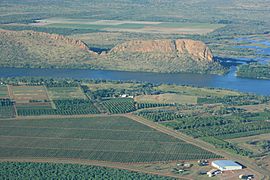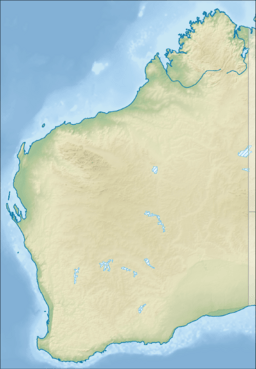Lake Kununurra facts for kids
Quick facts for kids Lake Kununurra |
|
|---|---|
 |
|
| Location | Kununurra, Western Australia |
| Coordinates | 15°48′31.8″S 128°44′22.6″E / 15.808833°S 128.739611°E |
| Type | Freshwater reservoir |
| Primary inflows | Lake Argyle |
| Primary outflows | Ord River |
| Basin countries | Australia |
| Designation | Lakes Argyle and Kununurra Ramsar Site; Ord Irrigation Area Important Bird Area |
| Built | 1959 |
| First flooded | 1963 |
| Max. length | 55 km (34 mi) |
| Max. width | 0.4 km (0.25 mi) |
| Water volume | 90 GL (3.2×109 cu ft) |
| Surface elevation | 40 m (130 ft) |
| Official name: Lakes Argyle and Kununurra | |
| Designated: | 7 June 1990 |
| Reference #: | 478 |
Lake Kununurra is a large, man-made freshwater lake in the Ord River valley. It was created in 1963 when the Ord Diversion Dam was built near Kununurra in northern Western Australia. This dam helps supply water for farming in the Ord River Irrigation Area. Before the dam, this area had a natural waterhole called "Carlton Reach," which was known as the biggest waterhole in the Kimberley region.
Contents
About Lake Kununurra: A Man-Made Lake
Lake Kununurra stretches for about 55 km (34 mi) from the Diversion Dam. It flows upstream towards the even larger Lake Argyle. Near the town of Kununurra, the lake connects to Lily Creek Lagoon.
This lake is home to freshwater crocodiles and 21 different kinds of fish. It's a popular spot for locals and tourists who enjoy fishing and boating. Because the water levels in Lake Kununurra stay steady, its edges have lots of plants like grassland, rushes, and woodland.
Wildlife and Nature: Birds and Crocodiles
The lake and its nearby wetlands, along with Lake Argyle, are part of the Lakes Argyle and Kununurra Ramsar Site. This means they are recognized internationally as important wetlands.
Birds of the Ord Irrigation Area
Lake Kununurra is also part of the Ord Irrigation Area Important Bird Area (IBA). This area is very important for wild birds, especially small birds called estrildid finches. BirdLife International has identified this area because so many birds live here.
Crocodiles in the Lake
While the lake is mostly known for freshwater crocodiles, a saltwater crocodile was seen in the lake in 2014. It was about 3 metres (10 ft) long and had managed to get past the dam walls. Local rangers worked to safely catch the crocodile.
Engineering History: The Diversion Dam
The Ord Diversion Dam is a significant structure. It has been recognized with an Engineering Heritage Marker by Engineers Australia. This award is part of their Engineering Heritage Recognition Program. It highlights the dam as a historic landmark in agricultural engineering.
 | Aurelia Browder |
 | Nannie Helen Burroughs |
 | Michelle Alexander |


